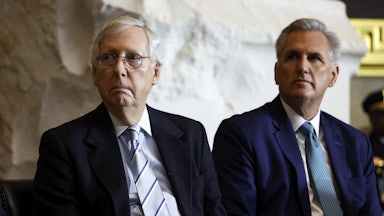There is no need to subject Republican Herschel Walker’s loss to Democrat Raphael Warnock in Tuesday’s Georgia Senate runoff to complicated analysis. Walker, a former running back and certified weirdo, lost because he was a terrible candidate—perhaps a historically terrible candidate. In a midterm election with several very bad candidates—Blake Masters (evil department-store mannequin), Dr. Mehmet Oz (literal snake oil salesman), and Kari Lake (North Korean newsreader)—Walker somehow eclipsed them all. He seemed to have little grasp on public policy and no clue about the responsibilities of the job for which he was ostensibly running. He was a congenital liar who had been accused of domestic abuse by an ex-wife, fathered several children out of wedlock, and paid multiple women to have abortions. He somehow managed to talk as much about werewolves and vampires as he did about the cost of living. Also, he actually lived in Texas, not Georgia.
Let’s see, what else did Walker have working against him? Warnock ran a particularly deft campaign aimed at swing voters and moderate Republicans. Stacey Abrams has spent years registering voters in the state. Democratic lawyers fought back against lawsuits aimed at suppressing turnout. Mostly, however, Herschel Walker lost because Herschel Walker had no business running for the U.S. Senate in Georgia or anywhere else—including Texas, where, again, he actually lives.
But Walker did run for Senate, and the reason he was the Republican nominee at all was because Donald Trump said so. Walker’s loss makes Trump’s year of failed kingmaking even worse—and it was very bad before. But the cursed hand by which he picked midterm favorites was only one failure among many for the former president. This was a year of damaging investigations, of Mar-a-Lago being searched by the FBI, of Ron DeSantis, of Truth Social sucking, of his company being convicted of tax fraud, and these are just the highlights among the scandals, gaffes, and fuck-ups. Oh, see, I almost forgot about his antisemitic dinner date with Kanye and Nick Fuentes!
Where our political narrative is concerned, however, this was the year that Donald Trump started to seem fallible—after six years, his iron grip over the Republican Party has clearly begun to slip. In the midterm elections, he boldly endorsed many of the most extreme candidates because electability wasn’t nearly as important as blind loyalty to what has become the only plank of Trump’s political platform: The 2020 election was stolen, and he is the one true president, in exile in modern-day Avignon (a garish club in South Florida).
Was the Georgia runoff that big a factor in evaluating Trump’s relationship with his party? A Walker victory wouldn’t have changed the basic contours of the predicament that Donald Trump and Republicans find themselves in, but his defeat only makes it clearer. Trump’s influence has evidently been a drag on the party for several elections now; he pushes extreme candidates in swing states and the media discourse. In the midterms, he endorsed 16 candidates in states that Joe Biden won in 2020; two prevailed. One, Nevada gubernatorial candidate Joe Lombardo, narrowly won his race; the other, Wisconsin Senator Ron Johnson, was an incumbent who hasn’t needed Trump’s help.
Trump looks weaker than he ever has. The investigations and electoral defeats have taken their toll. Ever since Trump’s handpicked candidates face-planted last month, mainstream Republicans have been pondering a way to dump him. Trump declared his presidential campaign a week after the midterms, but it’s mostly been a dud; he hasn’t done events and has only been endorsed by a handful of figures, mostly his most craven loyalists and strivers. When he does give speeches or make public statements (via his janky social media platform Truth Social), they’re mostly a myopic set of petty grievances related to the “stolen” 2020 presidential election.
Historically, Trump’s power has always derived from the ironic aura of invincibility that surrounded him: He was constantly scandal-plagued and yet somehow always hung on. If you were going to take down Donald Trump, this is the time. Over the last month, several stories have circulated to this effect, in which Republicans carp to reporters about how the party must ditch its dead weight and embrace a new, less charismatic, but also less deficient model, like DeSantis.
While there is an abundance of Republicans willing to talk about the need to move on from Trump, hardly any seem to have the stomach to actually do something about it. Over the weekend, Trump called for the Constitution to be terminated (or at least the parts of it that say a guy can’t just magically declare himself president) in response to Matt Taibbi’s embarrassing and limp report about Twitter’s decision to suppress Hunter Biden’s dick pics. Republicans confronted this insidious bit of authoritarianism with thumb-twiddling passivity. “Anyone seeking the presidency who thinks that the Constitution could somehow be suspended or not followed, it seems to me would have a very hard time being sworn in as president of the United States,” Senate Minority Leader Mitch McConnell said. It’s a clever bit of rhetoric from a master of political wordplay: McConnell isn’t saying he wouldn’t support Trump or even that Trump shouldn’t be president. He’s simply saying that Trump’s actions should be recognized as unpresidential by others—namely voters—who should be willing to come together and solve McConnell’s problem on his behalf. (Most Republicans, for what it’s worth, have said nothing about Trump’s calls to terminate the Constitution.)
We’ve been here so many times before. Republicans faced this choice throughout the 2016 presidential contest, particularly after the Access Hollywood leak. Each and every time, they failed to take action, assuming that some more powerful force would bail them out. Now the great post-Trump hope is that Ron DeSantis will ride in on a white stallion and somehow save the party without anyone having to make an effort. And the reason they don’t want to have their fingerprints on Trump’s banishment from the party remains the same: They know that Trump will sic his millions of followers on them if they do, with potentially damaging political consequences. All this talk of finally breaking Trump’s hold on the party is still just the same acknowledgment of that hold, a tacit admission that Trump remains the most powerful force in conservative politics—by far.
Republicans know that they can’t quit Trump. Trump’s lies about a stolen election are a huge part of the GOP’s platform for the foreseeable future. This is still the party of voter suppression and electoral subversion and conspiracies about counting, voting machines, and ballot dumps. Trump’s ersatz replacements, particularly DeSantis but including Virginia Governor Glenn Youngkin, often sound like Trump tribute acts: They invent bogus conflicts on an hourly basis and rage against “woke” culture, drag shows, and children being taught the truth about American history.
So while it’s been a rotten year for Trump, the former president refuses to fall. And fall he must: If the GOP were to push Trump out, it would ignite a civil war against the party. And so the Republican Party is stuck holding the same fantastical hopes to which it clung desperately in 2016, which are as fantastical as ever—that Trump will somehow take the hint that he’s not a successful political leader and line up behind a new standard-bearer, cheerfully urging his army of devotees to the polls.
That simply isn’t going to happen. The Republican Party is just stuck in the same old loop of history repeating. No new knowledge or insight was acquired from Trump’s inability to pick midterm winners. Everybody knows that Donald Trump is bad for the GOP’s electoral future. Everybody knows that he will continue foisting Herschel Walkers on the party and continue to insist that his stolen election is the party’s cause célèbre. Everybody knows that Trump will continue to push failed policies and exacerbate the nation’s problems. Everybody knows that the GOP desperately wants to get rid of him. And everybody knows that they’re all too scared to try.










